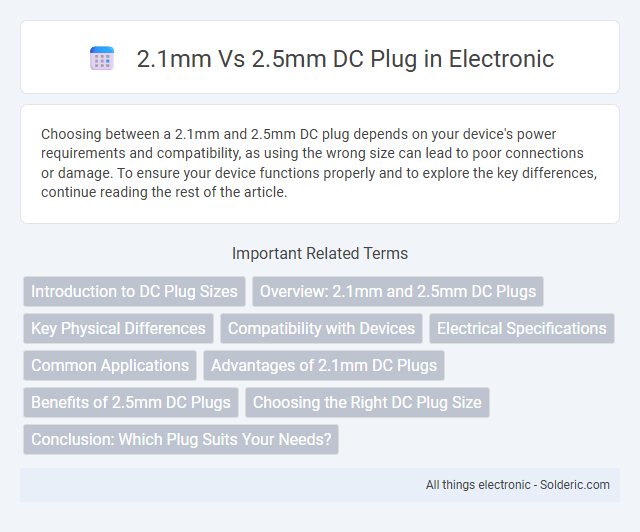Choosing between a 2.1mm and 2.5mm DC plug depends on your device's power requirements and compatibility, as using the wrong size can lead to poor connections or damage. To ensure your device functions properly and to explore the key differences, continue reading the rest of the article.
Comparison Table
| Feature | 2.1mm DC Plug | 2.5mm DC Plug |
|---|---|---|
| Pin Diameter | 2.1mm | 2.5mm |
| Outer Barrel Diameter | 5.5mm | 5.5mm |
| Common Usage | Electronics, CCTV, routers | Larger devices, some laptops |
| Current Capacity | Up to 5A | Up to 7A |
| Voltage Compatibility | Typically 12V-24V | Typically 12V-24V |
| Connector Compatibility | Widely used standard | Less common, specific devices |
| Physical Fit | Slightly smaller pin, snug fit | Larger pin, may not fit 2.1mm sockets |
Introduction to DC Plug Sizes
2.1mm and 2.5mm DC plugs are common sizes used for power connections in various electronic devices. The 2.1mm plug typically supports lower current applications, while the 2.5mm plug is designed for slightly higher current capacities, providing improved stability and power delivery. Understanding the correct DC plug size for Your device ensures compatibility and prevents potential damage from incorrect voltage or current flow.
Overview: 2.1mm and 2.5mm DC Plugs
2.1mm and 2.5mm DC plugs are common sizes used for power connections in electronic devices, distinguished mainly by their inner diameter measurements, which affect compatibility. The 2.1mm plug has a slightly smaller inner barrel diameter, making it a standard choice for many consumer electronics like routers and LED strips, while the 2.5mm plug caters to devices requiring a bit larger connection for higher current flows. Ensuring your equipment matches the correct plug size prevents power issues and connection failures, maintaining efficient device operation.
Key Physical Differences
The 2.1mm and 2.5mm DC plugs differ primarily in their inner barrel diameter, with the 2.1mm plug having a smaller inner barrel compared to the 2.5mm. This size difference impacts compatibility with devices, as each plug is designed to fit specific sockets to ensure a secure electrical connection. The outer barrel diameter is typically consistent, but the inner diameter variation is critical for ensuring proper fit and preventing power supply issues.
Compatibility with Devices
2.5mm DC plugs are commonly used in larger electronic devices such as laptops and power adapters, while 2.1mm plugs are typically found in smaller gadgets like routers, LED lighting, and security cameras. The slight difference in diameter affects compatibility, making it crucial to match the plug size with the device's power socket to ensure proper electrical contact and avoid damage. Using a 2.1mm plug in a 2.5mm socket or vice versa can result in loose connections or failure to deliver power effectively.
Electrical Specifications
A 2.1mm DC plug typically supports current ratings up to 5 amps and voltage levels up to 12V, making it suitable for low to medium power devices. In contrast, the 2.5mm DC plug can handle slightly higher current, often up to 7 amps, and voltage ratings up to 24V, providing enhanced power capacity for more demanding electronics. Both plugs differ in inner diameter and contact surface area, affecting electrical resistance and overall efficiency in power delivery.
Common Applications
2.1mm DC plugs are widely used in consumer electronics such as laptops, LED lighting, and CCTV cameras due to their optimal size and power handling capabilities. The 2.5mm DC plug is favored for applications requiring slightly higher current capacity, including industrial equipment and larger electronic devices. Choosing between the two depends on the device's power requirements and connector compatibility.
Advantages of 2.1mm DC Plugs
2.1mm DC plugs offer a more secure and stable connection for low-voltage power supplies, reducing the risk of accidental disconnection compared to 2.5mm plugs. Their smaller size allows for compact device designs without compromising electrical contact reliability, making them ideal for portable electronics. If your device demands efficient space utilization with dependable performance, 2.1mm DC plugs provide a balanced solution.
Benefits of 2.5mm DC Plugs
2.5mm DC plugs offer improved durability and a more secure connection compared to 2.1mm plugs, reducing the risk of accidental disconnection in high-vibration environments. Their slightly larger size supports higher current capacities, enhancing power delivery efficiency for devices requiring stable voltage. The common industry adoption of 2.5mm plugs also increases compatibility with a broader range of electronic equipment and accessories.
Choosing the Right DC Plug Size
Selecting the right DC plug size between 2.1mm and 2.5mm hinges on the device's power requirements and compatibility with the connector. The 2.1mm plug typically suits low to moderate power applications, providing a snug fit for many consumer electronics, while the 2.5mm plug often supports higher current devices requiring a sturdier connection. Mismatched plug sizes can lead to poor electrical contact or damage, so confirming the exact specifications from device manuals or power adapters is essential for optimal performance and safety.
Conclusion: Which Plug Suits Your Needs?
The 2.1mm DC plug offers a more compact design ideal for smaller, low-power devices, while the 2.5mm DC plug supports higher current capacity and is suited for more robust electronic applications. Choosing the right plug depends on your device's power requirements and size constraints, with 2.1mm plugs typically used in consumer electronics and 2.5mm plugs favored in industrial or higher-power equipment. Ensuring compatibility with your device specifications is crucial for reliable performance and safety.
2.1mm vs 2.5mm DC Plug Infographic

 solderic.com
solderic.com